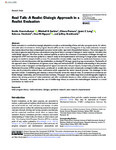Real Talk: <b>A Realist Dialogic Approach in a Realist Evaluation</b>
| dc.contributor.author | Francis-Auton, Emilie | |
| dc.contributor.author | Sarkies, MN | |
| dc.contributor.author | Pomare, C | |
| dc.contributor.author | Long, Janet | |
| dc.contributor.author | Hardwick, Rebecca | |
| dc.contributor.author | Nguyen, Hoa Mi | |
| dc.contributor.author | Braithwaite, J | |
| dc.date.accessioned | 2022-11-02T09:30:46Z | |
| dc.date.available | 2022-11-02T09:30:46Z | |
| dc.date.issued | 2022-01 | |
| dc.identifier.issn | 1609-4069 | |
| dc.identifier.issn | 1609-4069 | |
| dc.identifier.other | ARTN 16094069221120748 | |
| dc.identifier.uri | http://hdl.handle.net/10026.1/19817 | |
| dc.description.abstract |
<jats:p> Realist evaluation is a method increasingly adopted to provide an understanding of how and why a program works, for whom, and under what circumstances. Initial program theories (IPT) are the crucial starting point of any realist evaluation, however descriptions about how they are developed in practice remain under-reported in the published literature. This article argues for the value of genuine research-group conversations using David Bohm’s concept of dialogue in realist research. We label it the realist dialogic approach. We draw out the relational qualities as well as the contextual circumstances of dialogue through our development of IPT and interview guides for a research study on the implementation and scaling of a large-system value-based program to transform complex health services. We selected the relevant middle-range theories, conducted a literature review, and drew on informal discussions with key stakeholders, to develop IPT through research-group conversations. The benefits of this approach were: 1) development of rigorous, novel, deep and well-tailored IPT, 2) detailed understanding of the complex intervention under investigation and development of rapport and networks with participants, 3) empirically grounded Context-Mechanism-Outcome (CMO) configurations, predicated on suitable abstract and contextually-contingent middle-range theories, and 4) productive research team interactions which supported the entire research process. The challenges of this approach include: 1) establishing and retaining a sense of humility across the research team, 2) contextual circumstances can hinder dialogic relationship, and 3) time and resource heavy. This paper uses middle-range theory and ethnographic insights to advance the existing practice of realist evaluations and offer transferable lessons to other scholars considering similar approaches. Moreover, we content that the use of middle-range theory to extend the methodological literature is a novel contribution to realist work. </jats:p> | |
| dc.format.extent | 160940692211207-160940692211207 | |
| dc.language | en | |
| dc.language.iso | en | |
| dc.publisher | SAGE Publications | |
| dc.subject | initial program theory | |
| dc.subject | realist evaluation | |
| dc.subject | dialogue | |
| dc.subject | qualitative research | |
| dc.subject | team research | |
| dc.subject | implementation | |
| dc.title | Real Talk: <b>A Realist Dialogic Approach in a Realist Evaluation</b> | |
| dc.type | journal-article | |
| dc.type | Journal Article | |
| plymouth.author-url | https://www.webofscience.com/api/gateway?GWVersion=2&SrcApp=PARTNER_APP&SrcAuth=LinksAMR&KeyUT=WOS:000843502600001&DestLinkType=FullRecord&DestApp=ALL_WOS&UsrCustomerID=11bb513d99f797142bcfeffcc58ea008 | |
| plymouth.volume | 21 | |
| plymouth.publication-status | Published | |
| plymouth.journal | International Journal of Qualitative Methods | |
| dc.identifier.doi | 10.1177/16094069221120748 | |
| plymouth.organisational-group | /Plymouth | |
| plymouth.organisational-group | /Plymouth/Faculty of Health | |
| plymouth.organisational-group | /Plymouth/Faculty of Health/Peninsula Medical School | |
| plymouth.organisational-group | /Plymouth/Research Groups | |
| plymouth.organisational-group | /Plymouth/Research Groups/FoH - Community and Primary Care | |
| plymouth.organisational-group | /Plymouth/Research Groups/Plymouth Institute of Health and Care Research (PIHR) | |
| plymouth.organisational-group | /Plymouth/Users by role | |
| plymouth.organisational-group | /Plymouth/Users by role/Academics | |
| dc.identifier.eissn | 1609-4069 | |
| dc.rights.embargoperiod | Not known | |
| rioxxterms.versionofrecord | 10.1177/16094069221120748 | |
| rioxxterms.licenseref.uri | http://www.rioxx.net/licenses/all-rights-reserved | |
| rioxxterms.type | Journal Article/Review |


